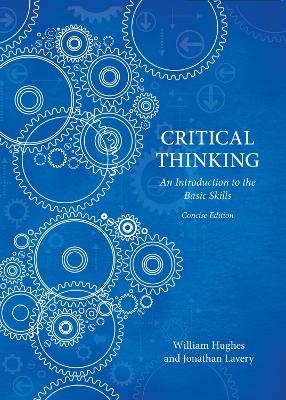
Critical Thinking
Broadview Press Ltd (Verlag)
978-1-55481-267-7 (ISBN)
- Titel z.Zt. nicht lieferbar
- Versandkostenfrei innerhalb Deutschlands
- Auch auf Rechnung
- Verfügbarkeit in der Filiale vor Ort prüfen
- Artikel merken
Critical Thinking is a comprehensive introduction to the essential skills of good reasoning, refined and updated through seven editions published over more than two decades. This concise edition offers a succinct presentation of the essential elements of reasoning that retains the rigor and sophistication of the original text. The authors provide a thorough treatment of such central topics as deductive and inductive reasoning, logical fallacies, how to recognize and avoid ambiguity, and how to distinguish what is relevant from what is not. A companion website provides a range of interesting supplements, including interactive review materials, supplemental readings, and writing tips.
The late William Hughes was Professor and Chair in the Philosophy Department at the University of Guelph, USA. Jonathan Lavery is Associate Professor of Society, Culture, and Environment at Wilfrid Laurier University, Brantford.
Acknowledgments
Online Materials
PART ONE: INTRODUCTION
Chapter 1: Reasoning and Critical Thinking
Reasoning
The Concept of Logical Strength
Truth, Logical Strength, and Soundness
Critical Thinking Skills
Critical Thinking and the Science of Logic
Self-Test No. 1
Questions for Discussion
PART TWO: MEANING
Chapter 2: Meaning and Definition
The Complexity of Language
The Meaning of Language
The Reference Theory of Meaning
The Idea Theory of Meaning
Meaning as Use
The Main Functions of Language
Self-Test No. 2
Questions for Discussion
Definition
The Purposes of Definition
Reportive Definitions
Stipulative Definitions
Essentialist Definitions
Methods of Definition
Genus-Species Method
Ostensive Method
Synonym Method
Operational Method
Contextual Method
Assessing Reportive Definitions
Too Broad a Definition
Too Narrow a Definition
Too Broad and Too Narrow a Definition
Circular Definition
Obscure Definition
Assessing Stipulative and Essentialist Definitions
A Warning
Self-Test No. 3
Questions for Discussion
Chapter 3: Clarifying Meaning
The Principle of Charity
Linguistic Ambiguity
Ambiguity and Vagueness
Referential Ambiguity
Grammatical Ambiguity
Use and Mention
Self-Test No. 4
Analytic, Contradictory, and Synthetic Statements
Self-Test No. 5
Descriptive and Evaluative Meaning
Self-Test No. 6
Necessary and Sufficient Conditions
Self-Test No. 7
Questions for Discussion
Chapter 4: Reconstructing Arguments
Reconstruction
Missing Premises and Conclusions
Self-Test No. 8
Special Cases
Reports of Arguments
Explanations
Self-Test No. 9
The Structure of Arguments
Simple Arguments
T Arguments
V Arguments
Complex Arguments
Self-Test No. 10
Another Warning
Questions for Discussion
PART THREE: ASSESSING ARGUMENTS
Chapter 5: Strategies for Assessing Arguments
The Fallacies Approach
The Criterial Approach
The Three Criteria of a Sound Argument
Seven Rules for Assessing Arguments
Rule 1. Identify the Main Conclusion
Rule 2. Identify the Premises
Rule 3. Identify the Structure of the Argument
Rule 4. Check the Acceptability of the Premises
Rule 5. Check the Relevance of the Premises
Rule 6. Check the Adequacy of the Premises
Rule 7. Look for Counter-Arguments
Chapter 6: Assessing Truth-Claims
Theories of Truth
The Correspondence Theory
The Coherence Theory
The Pragmatic Theory
Types of Truth-Claims
Empirical Truth-Claims
Non-Empirical Truth-Claims
Acceptability
Self-Test No. 11
Questions for Discussion
Assessing the Acceptability of Premises
Some Particular Fallacies
Begging the Question
Inconsistency
Equivocation
False Dichotomy
Self-Test No. 12
Questions for Discussion
Chapter 7: Assessing Relevance
The Criterion of Relevance
Recognizing Irrelevant Premises
Appeals to Authority (1)
Some Particular Fallacies
Ad Hominem
Tu Quoque
Straw Man
Self-Test No. 13
Questions for Discussion
Chapter 8: Assessing Adequacy
The Criterion of Adequacy
Appeals to Authority (2)
Appeals to Anecdotal Evidence
Appeals to Ignorance
The Slippery Slope Fallacy
Causal Fallacies
Post Hoc
Confusing Cause and Effect
Common Cause
Self-Test No. 14
Questions for Discussion
Chapter 9: Deductive Reasoning
The Nature of Deductive Reasoning
Truth-Functional Statements
Formal Validity and Soundness
Valid Argument Forms
Formal Invalidity
Self-Test No. 15
Questions for Discussion
Chapter 10: Inductive Reasoning
The Nature of Inductive Reasoning
Inductive Generalization
Statistical Syllogism
Induction by Confirmation
Analogical Reasoning
Self-Test No. 16
Questions for Discussion
Chapter 11: Arguing Back
Explaining the Weakness
Counter-Examples
Absurd Examples
Counter-Arguments
Self-Test No. 17
Questions for Discussion
Chapter 12: Irrational Techniques of Persuasion
Loaded Terms
Vague Terms
Loaded Questions
False Confidence
Selectivity
Misleading Statistics
Humor
Red Herring
Guilt by Association
Persuasive Redefinition
Self-Test No. 18
Questions for Discussion
Appendix: Answers to Self-Tests
Glossary
Index
| Sprache | englisch |
|---|---|
| Maße | 165 x 229 mm |
| Gewicht | 410 g |
| Themenwelt | Geisteswissenschaften ► Philosophie ► Allgemeines / Lexika |
| Geisteswissenschaften ► Philosophie ► Logik | |
| ISBN-10 | 1-55481-267-4 / 1554812674 |
| ISBN-13 | 978-1-55481-267-7 / 9781554812677 |
| Zustand | Neuware |
| Haben Sie eine Frage zum Produkt? |
aus dem Bereich


